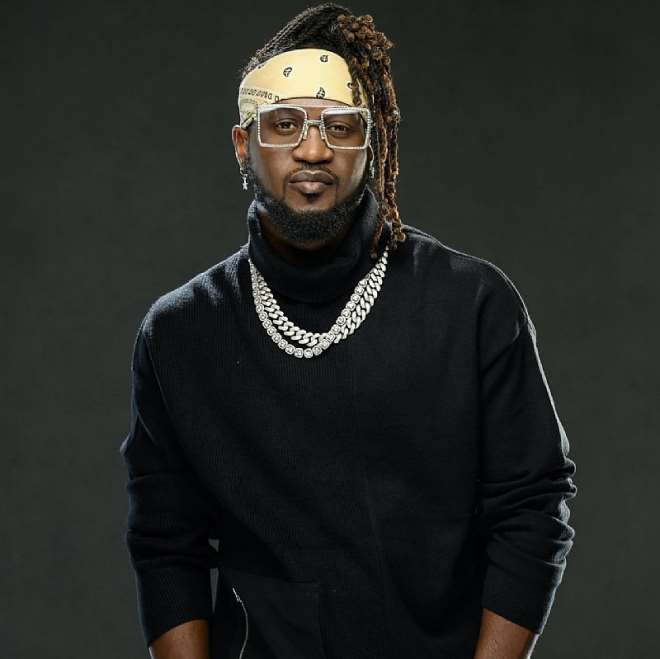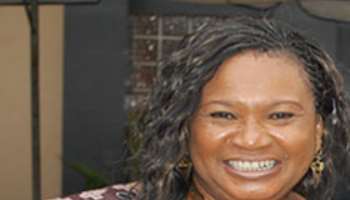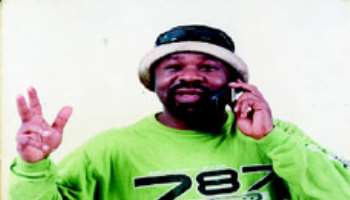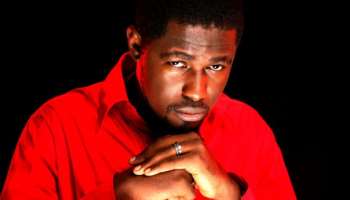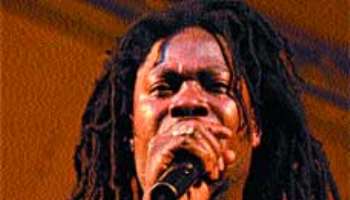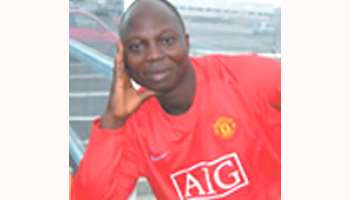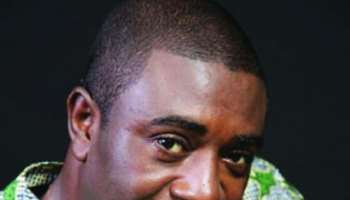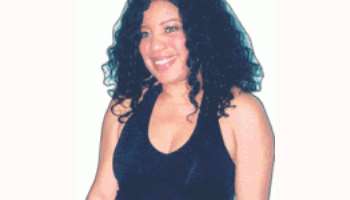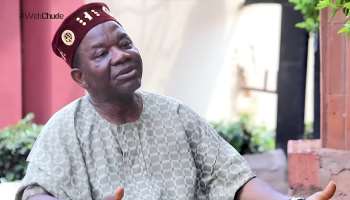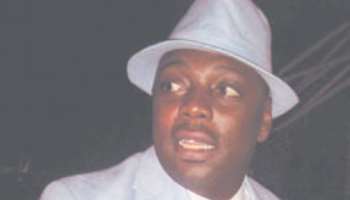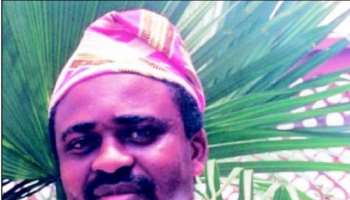Paul Okoye: Family, Legacy, Rudeboy
This is the concluding part of our Psquare special: An insight into the minds of brothers Paul and Peter Okoye, who split in 2017 and found their way back to each other after 5 years as solo acts. Each interview explores the pain of a split, the circumstances surrounding the decision to break up a functioning partnership, and an exploration of artistic individualism within successful music groups. To read the first part on Peter Okoye (Mr P), click here.
“O boy, how far na?”
Paul Okoye takes some time to get to the laptop, sitting at his living room table, in his Lagos home. He peers into the computer, where I stay smiling at the other end, waiting for a conversation about spending the twilight of his successful career as a solo act. A management team member presses a few buttons on the laptop and gives him the all-clear to engage. “it should be fine now,” he says, as Paul Okoye’s attention is taken by someone else in the room seeking clarity on a subject. “Erm, yes, na that one…” Paul answers, before adjusting the camera one more time, and getting into our conversation.
With Paul Okoye, you can never fully get the complete picture of anything beyond music. He’s taciturn in an effusive fashion. He appears to tell you everything while avoiding invasive topics that provide the most clarity in this situation. Topics related to the bond of brotherhood, and the state of the family. Paul first made the headlines as part of the Nigerian pop group, Psquare. A family man through and through, he’s part of a legacy singing machine formed in partnership with his brother, Peter Okoye. Together, they’ve become heroes of Nigerian pop music, creating, recording and releasing dominant music that time has only made more iconic.
Regarded highly as the creative engine of Psquare, Paul Okoye might lack the showmanship and natural exhibitory flair as his brother, but he’s rooted in the art of songwriting, crafting poignant melodies, getting the large share of the recording process right, and ultimately defining the Psquare sound. He takes pride in that reputation, leaning into it, and sharing stories that offer credibility to the public consideration of his powers. He tells me about his dreams and how they make up a strong part of his world-beating run. “If you say how do I write? it means I'd be listening to something and I'd create, no,” he explains. “Everything comes from my dream. I'd be sleeping and I'd see myself singing, and I'd wake up and be hearing beats in my head. Whatever I sang in my dream, I'd use my phone to record it. From “Do Me” to “No One Like You.” I can remember “Do Me”'s own very well. I just woke up and heard, "do me, do me, do me, make you do me." Even the beat.”
That’s weird. But it’s a rare gift. It doesn’t seem fair that some musicians can become so well versed in their craft that they can actually tap into their own subconscious to dream up parts—or the entirety—of a new song to add to their already impressive catalogues. But the history of music has a long, seldom-acknowledged road filled with successful dreamers. From Paul McCartney jumping off a deep slumber and playing the tune of “Yesterday,” to Florence and the Machine receiving a visit from her deceased grandma who essentially gave her the lyrics to a song. Paul Okoye tells me he walks that same road, and it’s his creative trump card for scoring the biggest songs.
“I'm telling you,” he insists, sensing my surprise. “So, I woke up and was recording from my phone, and I went downstairs to the studio and started hitting the same thing and said, ‘You know what? This is good.’ I waited for the studio engineer to come. Then, it was J Martins. He came and I said, "Let's go. I have a song." This is how they come. “No One Like You,” too. My brother, so when somebody asks, "How did you know?" I did not know. Tomorrow, if you see that I'm bringing forth a new sound, I did not know. This is how it's coming out. It started like that from the last album from Psquare till today. It's still following me. I don't know, but I know it's God. So, I don't look at myself as if I'm talented, I'm just gifted.”
Going solo for five years and staying away from his beloved brother fazed Paul. Just a little bit. As part of a machine, he says everyone took responsibility in their areas of strength. He handled the music. Jude Okoye took care of the visuals. And Peter was his live-action stage support, the guy who handled how the music was presented on stage. To get his groove on, Paul only needed to fix the presentation of his art, dig his boots into his extensive experience and find a way to control the public-facing aspect of his craft. The music was a given, and his solo hits including 2021, “Reason with me,” are his proof of a good time, winning without familial help. “I remember that I started doing little concerts, concerts of 1,000 - 2,000 capacity,” he says, building his confidence on the road. “The moment I started dropping hits like “Reason with me,” I started doing stadiums like we used to do before. So, the moment I started doing that, I knew it was about time. I waited for that long. I didn't want to rush. I just wanted to make sure I got to that point, so I'd be like, "Okay, I'm there now. Let's do it."
At times, Paul Okoye’s music can sound like all the artists that dominated his childhood, and dozens more across the 1970s and ‘80s highlife, guitar-dominant, big celebratory scene, from Osadebe to Oliver de Coque. But those specific influences blend to make something distinct: An endless stream of extracted traditional melodies combining measured messages on life with an insistence on love, money and family. His last solo album, Rudykillus underscores this. In a world peppered with a raft of exciting new Nigerian artists, Paul Okoye stands out for his relentlessness, making music that adults can enjoy, as well as teens who grew up on Psquare’s inspirations. It is partly what has led the group to many big moments in pop music with hits like “Bank Alert,” “Beautiful Onyinye,” and more. Songs that cut through every demography. Records that unify countries. Tracks to shutdown stadiums. Rudykillus, an album title coined from the undying screams of fans demanding their metaphorical death at his hands, (“Rudy, kill us with music”), is replete with similar artistic direction.
Going solo was hard for Paul, particularly at the start. Having abandoned all the other facets of his music business to his other co-creators, he found himself leaving his comfort zone to hustle as a new artist. Being a studio rat was no longer enough. Other aspects of his game needed work. He had to be a student again, taking lessons on how to navigate the media, emerging marketing techniques and tools, the finer points of distribution and the best fashion to deal with the world outside. He had to overhaul everything, except the music. “For someone like me, during the period when I was in the group, I didn't handle my social media myself,” he says. “I wasn't into the social media thing, because to me, it was more like a division. My own was just to go into the studio, record the songs and get them out, then ask what next. We talk about the video. Next? So, how do we do the next song? I was more like inside the box. My job was to go to the studio and record the song, write to the producer and all.
He continues: “That was what I did. So, when I became solo, I needed to understand and study the music industry, because all I knew was to go to the studio and record. Do you expect me to ask myself what was next? Because I never knew what was next then. That's why it took me that time. I needed to study marketing, and how to relate with the media because then, I wasn't a spokesman in the group.”

All through the height of the Psquare breakup in 2017, and the attendant controversy, Paul maintained his silence. While his brother Peter Okoye earned public ire as the instigator of conflict, Paul kept up a stoic exterior, choosing to wall off any prying inquiries with the declaration of “I don’t talk about family.” Never mind that fans cried their hearts out, with video recordings pleading for a resolution. Never mind the looming potential for financial losses from the breakup. Never mind the temptation of hyper-sharing that bedevils the internet era. Paul kept mum. “I kept silent. I never said anything. I never said anything, because I knew what the problems were. It was a family issue, and it turned out that Psquare had to pay for it. Psquare was just the sacrifice. It was a family issue, it had nothing to do with music. And because I respect family so much, I owe nobody any explanation,” he says.
But Paul is happy to share about music. He’s happy to talk about his work, his defiance of the world, and how his goose gets cooked in the studio. He finds meaning in the art, community in family, and inspiration in love and all its attendant emotions. We talk for hours about life as a solo artist, feeling your way as a singular entity, and the rewards of doing it on your own.
I'm perfect. How's your end?
All good.
You've been going on your media rounds. How stressful is it?
It's stressful, but it's just something you do once in a while. You know, once you drop something, you have the media calling you, "Please, can we come?" and there's no way you'd say no. So, you just try to control it. That's what I'm trying to do.
True, but you've always had this good relationship with the media.
Well, every artist should. Every artist should have a relationship with the media, but sometimes, the media goes a certain level where you go, "You know what? I'm done with interviews." I used to be like that before. There was a time I went, "You know what? I'm done. I'm not doing again." But at a certain time in your life, you'll no longer care what people say and do it the professional way.
True. You've seen a lot of things happen. You've been part of multiple changes in the game. So, we'll talk about that and we'll tie it into all of these. Is that good?
No problem.
Since you went solo in 2017, why did it take you — how many years now? Is it up to 5 or is it 4? — to get to the point where you are now?
Almost five years.
5 years. In those five years, how did you get ready for this?
I'm going to be honest with you. After the group breakup, I'm somebody who didn't want to be in a hurry. You have to make sure you build again with people who accept you as a solo artist. Because when you jump into the wagon of hurrying up to release an album — don't forget some fans were heartbroken and all, so you had to give them time to heal and you had to give them some kind of sorrow — I was trying to create the fanbase back again. You know, having my own fanbase. So, I started dropping those songs. Each time I dropped something, I could tell what was going to happen. So, during my solo career, before I could think of releasing an album, I wanted to at least be almost where Psquare had gotten to.
And while I was releasing songs, I was checking the numbers. If I tell you that I'd check the numbers and go back to that of Psquare's, I'd be like, "Okay. I'm not doing bad." But it got to a stage, as I was building again, don't forget stuff like YouTube subscriptions when Psquare ended was about 1.2 million subscribers. So you wouldn't expect someone like me to have 500,000 subscribers as a solo artist and then drop an album. No. I must at least hit 1 million. I needed to work hard. So, those were the pluses I was working on to make sure I got to a certain stage. The moment I started releasing songs, I was checking the numbers and they were doing great on the streets and all. It still wasn't enough. I was recording. But the moment I found out that one of my songs as a solo artist in two years was doing better than the whole Psquare discography. The song, Reason With Me, did well, especially on YouTube and even on other streaming platforms. The numbers were over two times the number of everything Psquare had made. It was when I knew that it was about time. "I think I'm ready." Because it was like a process. I never wanted to rush. "Okay. As a solo artist, let me drop an album." That would have been the biggest mistake.
I see a number of people who broke up, take for example, we had other groups break up in the past. A very famous one is One Direction, the boy band. When they split up, everybody dropped one to two singles and within a year, everybody had their debut albums out. When you went solo, people were like, "Okay. This is a race to the top," or whatever. We expected you to bombard everybody with singles and albums.
(Chuckles) You don't try that in Africa, bro. It'd be a big slap to you.
Continue, please.
Because back then, One Direction had their own group page, but at the same time, they had their individual pages, even on YouTube. So, everybody was building. While the management was building as a group, they were building individually. And I can tell you that the individual profiles they were creating were more than the group profile. So, after they went solo, everybody had the numbers. But for someone like me, during the period when I was in the group, I didn't handle my social media myself. I wasn't into the social media thing, because to me, it was more like a division. My own was just to go into the studio, record the songs and get them out, then ask what next. We talk about the video. Next? So, how do we do the next song? I was more like inside the box. My job was to go to the studio and record the song, write to the producer and all.
That was what I did. So, when I became solo, I needed to understand and study the music industry, because all I knew was to go to the studio and record. Do you expect me to ask myself what was next? Because I never knew what was next then. That's why it took me that time. I needed to study the marketing, how to relate with the media, because then, I wasn't a spokesman in the group. I'm sure everybody is aware of that. I wasn't speaking. They knew that I only kept quiet, I didn't talk. So, I needed to just try to fix those loopholes, because otherwise, I'd just have been. And that's why when I dropped my first single, everybody was like, "Try to do radio stations," and I was like, "Wetin concern me? Abeg, leave all these ones. Drop single, e go blow." Actually, it blew o. It worked, but they were telling me not to take that risk. "When you release a song, go to the media and announce." But before I no dey am now? They said, "No. Why did you think they would ask you only to dress and go for interviews? It was because somebody was arranging it for you."
So, I had to fix all those things and I had to relate with people. It took me time and as I was doing that, I was learning at the same time, and I was releasing the songs and the songs were moving, the numbers were moving. So, I had no choice. The moment I got to that point, I said, "It's about time." And I can't point out a particular period where I announced that I was working on the album. I was just recording, opened my studio catalogues and shuffled through them. I made decisions about what songs would make it, what songs wouldn't and where to make adjustments, and that was it. Because I'm always recording.
Would you say it's harder work for you now as a solo act than when you were in a group?
Yeah, you might say it's a bit hard. I don't think it's harder. All I needed to do was just study. In the past, like I said, I did the music and Jude did the video concepts and managed the group, and my twin brother handled the stage. So, everybody had what they were doing. Don't forget that there must be music before you think about all these.
Yeah, music is the heart. It's the music that makes everything work.
Exactly. So, when I finished the music, I'd just look. I had Jude by my side talking about video concepts and my twin brother worried about stage appearances and how to comport yourselves. Like I said, I love it, because the more I studied, the more I learnt. But back then, it was a bit easier. This time, at least I've finished learning and I'm adapting. I wanted to make sure that I reached a particular height and everything I lost, I was gaining back. I remember that I started doing little concerts, concerts of 1,000 - 2,000 capacity. The moment I started dropping hits like Reason With Me, I started doing stadiums like we used to do before. So, the moment I started doing that, I knew it was about time. I waited for that long. I didn't want to rush. I just wanted to make sure I got to that point, so I'd be like, "Okay, I'm there now. Let's do it."
How did you deal with all of those fans? People were angry. People were screaming at you guys, people were crying. I saw that happen a lot. How did you deal with all of that to get back the fan love? What did you do?
I kept silent. I never said anything. I never said anything, because I knew what the problems was. It was a family issue, and it turned out that Psquare had to pay for it. Psquare was just the sacrifice. It was a family issue, it had nothing to do with music. And because I respect family so much, I owe nobody any explanation.
It's family. It's your business.
Exactly. It's music. The only thing lacking now is that you might not be seeing us together, but last last, it's still music. If you want the music, it's the same voice. Nothing has changed. Some people don't like it when I say this, but this is a group, for God's sake. Everybody has a part they are playing in a group. If you see me on stage and say I'm not performing well, I was never a performer. I'm a musician, I sing. So, what I did to gain the fans' love was because I kept silent and never badmouthed anybody to the media, I never wanted to say anything because I knew it was a family issue, and I have decided to respect the family and focus on the music. That's what I did. And then, it took me time to release a solo song even when I went solo. Sorry, I didn't go solo. I'm still where I am, till today. When I mean I didn't go solo, I never left the group. I was just isolated there, so I had to move on. If I had my way, I'd even continue being Psquare. So, my silence and the good music made the fans go, "You know what? This guy is not talking. The guy is still giving us the same thing we used to hear. We are going with him." That's it.
And then, performances. How did you have to build that back up? What did you have to do?
You see, when you talk about performances, there are two types of performances. There's one that is just about you showing emotion, singing wholeheartedly or bringing someone on stage and using her name to freestyle and all, that is what I do. The other one is probably dancing and everything. I even slowed down with the dance because I had an accident where I cracked my rib. And I did so many surgeries to make sure that I'm fine now. But I was told that I should slow down with the dancing, so I did. But at my age, I can't be doing that anymore. I can't be dancing, I'm sorry. I'm in my early forties, I can't be doing that. I can dance for fun. Listening to music and moving your body. I can do that. But dance like jumping up and down like Chris Brown, I can't do that. Even Chris Brown sef is slowing down. Age is telling on everybody. So basically, that's it. It took me time.
One time, I went to Seychelles and that was the first day I cried backstage after the performance, because then I had only 5 singles out. So, I went to Seychelles and when we got to the airport, I said, "God, what's happening?" When you tuned into their radio station, there was this particular song they kept playing, “Fire Fire.” The guy that drove said, "This song is bigger than our national anthem.” I thought he was joking. When we arrived, I saw the reception and everything. I didn't bother, but the next day, I went to the stadium for a sound check. And this is the country they said their population is a little over 80,000 and they were telling me they had sold over 40,000 tickets. I said, "Does this mean half of the country are coming to this place? Is that what you are telling me?"
That must have blown your mind.
I was like, “Are you sure?” Bro, we got to the venue to do the show and I saw a particular queue. We drove for almost ten minutes and we were just seeing human traffic. We went through the back and there was a big screen, and I asked, "Please, those people that are outside, how are they going to enter? Because the place is filled up already." So, when they called me, I came with my band and we went on stage and started performing. I could remember that I performed “Fire Fire'' five times. It's like every one of my songs I performed, I performed “Fire Fire” after. When I finished performing, I went backstage and started crying. I said, "God, you promised me I'd be back again and I could do this." My brother, before you know, I started doing stadiums upon stadiums. Uganda, Mauritius, Equatorial Guinea and so on. I was performing back to back in stadiums. I saw that Psquare energy back and I was like, "Okay. Now, I can breathe." Like I told you, I started from Lagos, 1,000 to 2,000 capacities. And I still had performances in Malawi, South Sudan, their stadiums. So, I think I'll just say it's been God. Because I doubt that if it wasn't for God, I'd have succeeded.
I was in early secondary school when I started listening to Psquare. I was also hurt by the split, but I did understand that whatever we see on the front-end, even though we were hurt, it was deeper than music. It was way deeper than music.
Yeah. If it was music, what is there? We'd have written an agreement and said, "Okay. Let's do this and give it to the fans." But it's not music, that's why it's difficult. And I'm sorry, till I leave this world, I'll never open up at any point. It is a promise I gave my mom and I'll never do that.
It's good to know you are keeping it because that's very important. Let's talk about the album. Rudykillus, play on words and all of that. I thought it was very clever. Why? Why Rudykillus?
It's the fans that gave me that name. They were the ones who came as a group and said they wanted to name themselves Fire Department. They opened their fanpage and said I should welcome them and I did follow them. Then all of a sudden, every time I dropped a song, you'd hear them say, "Rudy, kill us o" or "Rudy is killing us o". So, I thought it was 'rudykillus' pronounced the same way as 'ridiculous'. It was later I discovered that it was "Rudy, kill us with music." So, everytime I released, they said, "Rudy, kill us. Rudy, kill us with music." That was like two years. The last time I heard more of it was when I released “Reason With Me,” and I thought that maybe I'd write a song that was titled "Rudy, Kill Us." But during the album phase, it wasn't so hard for me to say…I had so many names like, Man On Fire, hit I ended up going with Rudykillus. The fans gave that idea, so I made use of it.
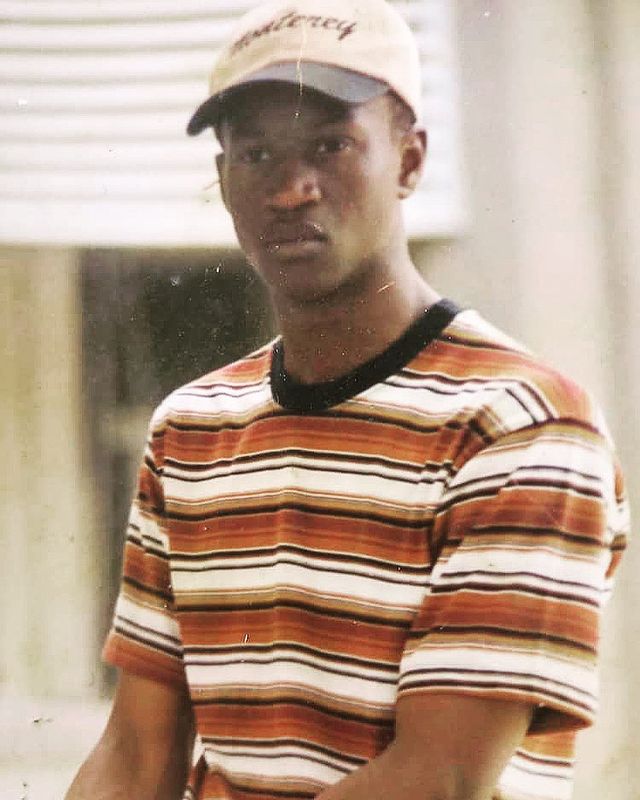
A post shared by Rudeboy (@iamkingrudy)
Why did you choose Rudeboy as your name? Where did it come from? I know you said it, even while you were in the group, you kept saying "Rudeboy". But why did you have to choose that?
First of all, I want to make it clear, I'm not rude. You need to understand the meaning of Rudeboy in Jamaican terms. They'll tell you, "Ah. This guy is a bad boy." And when you do something, they'll say, "This guy bad". Does that mean you are bad?
No, of course not.
What does it mean? It means that the guy is good with whatever he does. That's the meaning of Rudeboy. It means, musically rude. Musically, I'm good. Instead of using musically good, it means musically rude. But how I actually got that name, back then in Jos, I used to produce. I was a producer in Jos. Then, I was doing music alone, but I was producing other things. Just the fact that I knew so much about music. And when I say that I didn't study music, but I knew I heard something, I'd be like, "This is a song. This is music." So then, they'll tell you other producers collected N3,000 per beat, I collected N6,000 and they'd go, "This guy is expensive." But the funny thing was that every time I was producing, I listened to the person's song, I'd help the person write and coordinate the person. I was the producer of that song.
You were not just making beats.
Thank you. But I found out some people would just come, believing they had money but they were not talented. They'd be like, "Okay. You know what? I heard you were doing this thing. I have like six songs. I'll pay 5,000 naira for each song instead of paying 6,000 naira." I don't even care about your money. What I did was tell them I wanted to listen to the song first, or I'd play something and they would sing. That's when you know that some people just wake up and think music is something you can do. They'd say, "I came with cash. Here's your money." I said, "Keep your money. I can't do it." So, when I did that to three or four people, they started saying, "That guy is very good." "What's his name?" "That guy. That rude guy." So, then and there, I accepted it. Rude producer. When I started producing for us, even in “Bizzy Body,” you'd hear, "Ruuuuudeboy.” Everything in the project, from the beginning, because I was the producer in everything about Psquare. I was the writer, I was the singer, I was the producer, I was everything, and that was it.
How important is musical excellence? That's something that has always trailed you. How important is it that you have to present the best possible sound or the best possible music and it has to sound good? What does it mean to you?
It means that you actually took your time. It means you don't just wake up... because first of all, you need to study your fans and people don't get it right. There's a difference between the general public and your fans. They are two different things. And you can only get to the general public if you satisfy your fans. Then your fans spread it to the general public. It's a big mistake to try to satisfy the general public. Your fans are the first people to come out to say they are disappointed. Do you understand? I now had to ask which category someone belongs to.
Let me tell you the kinds of concerts I play. I play stadiums. I play weddings. You see weddings? I'm always there. In Nigeria, I play in Lagos. But recently, I found out that my spot is always the East, where I'm from. So, you don't expect me to make an album without touching all these elements. Now, most African countries and places I've been to in the world are Caribbean and islands. You know islands love reggae. It's about reggae, love and dancehall, and it's about melodies. In Africa too, Tanzania, it's about melodies, dancehall and everything. So, if you listen to my album, I kept it that way.
So, I looked at every category and told myself that I must try to complete it in the album. I have two Igbo songs, one is a gospel song, one is a wedding song. In fact, I did a song for white weddings and a song for traditional weddings. It's a must. And don't forget I've done “Nkenji Keke” before for traditional weddings. “Fire Fire” for white weddings, “Double Double” for white weddings. It doesn't stop there o. So, if I'm at your wedding, you'll dance till you beg me to stop. So, I made sure that I maintained all those things and love rock and storylines. There's a song called “Broke Land,” which has to do with not wanting to be in broke land. There's island, there's mainland, but you don't want to go to broke land. It's not a good place to be. So, it's a reality check song.
So, those are the things you have to touch and check if there's anything lacking. That was the most important thing I was looking at when I was arranging the album. Everybody in each category has theirs. You have the one for guys, the one for girls, there's one for even parents. You just make sure that you satisfy everybody. That's what I did in this Rudykillus album.
Since you are the heart of the music, and you did a lot of the production from way back. At the start, pop artists didn’t have a lot to work with, but you guys created it. How did you know what to work on? How did you know how to create those sounds?
The thing is this, I always repeat this when I'm having an interview, it's not me. Do you know I don't write songs? If you say how do I write, it means I'd be listening to something and I'd create, no. Everything comes from my dream. I'd be sleeping and I'd see myself singing and I'd wake up and be hearing beats in my head. Whatever I sang in my dream, I'd use my phone to record it. From “Do Me” to “No One Like You.” I can remember “Do Me” very well. I just woke up and heard, "do me, do me, do me, make you do me." Even the beat.
All from your dream?
I'm telling you. I woke up and was recording from my phone and I went downstairs to the studio and started hitting the same thing and said, "You know what? This is good." I waited for the studio engineer to come. Then, it was J Martins. He came and I said, "Let's go. I have a song." This is how they come. “No One Like You,” too. My brother, so when somebody asks, "How did you know?" I did not know. Tomorrow, if you see that I'm bringing forth a new sound, I did not know, this is how it's coming out. It started like that from the last album from Psquare till today. It's still following me. I don't know, but I know it's God. So, I don't look at myself as if I'm talented, I'm just gifted.
But has there been moments where you've tried to question it and harness it with intention? Or you've just allowed it to flow freely?
Well, when my mom was alive, she once told me something. She told me about a dream she had. It was a dream, but you know when we keep dreaming every week, it's like a continuation, a series. My mom kept dreaming about this thing. She said something like, "God said he's going to put something in your head. He's going to give you a gift, something, and make sure you utilize it." So, my mom kept saying that and I didn't know what was going on. She kept saying, "I saw you on stage, thousands of places, travelling to the whole world." She kept reminding me. So, the moment it started happening, I didn't need to question it because I knew.
Let me tell you something. Do you know I can go to the studio sometimes and a producer comes with beats and everything, it'd shock you, nothing comes out? We end up doing nothing. Then, after listening to it, I'd let it go. Then, I'd tell the guy to put it in the system and we leave. But you know what? Later, that thing might come in the dream and if I think about where I'd heard the sound before, I'd go to the system and actually find the beat there. God's time is the best. I think the only time it's easier for me is when an artist comes with a song and wants us to collaborate and they'd send it to me. All I just need to know is where the song is going. It's not a problem for me. I never had a problem with that. But you see, creating a song and saying this song is going to be a hit? No. Sometimes, when I'm working in the studio, my brother Jude, comes around and he says, "Nice song o. Hope say na from dream o? Na from dream this one come from?" I'd say Yes. So, it works that way.
I listened to the album and discovered three very distinct themes here. Love, money, and family. Why are those your topics? Why do you operate along that spectrum?
Okay. First of all, I'm sorry, as a musician, I don't know how you want to do music without love getting involved. And when I say love, I'm not talking about love of a country and co o. Some people have tried the love of a country thing, it didn't work. We are talking about love between a man and a woman, because trust me, if there's love in the house, there's going to be love in the nation. So, love must exist. Love is what attracts even the music business. It's a guy who loves his girlfriend that can take her and her friends to a concert and pay for it. That's love. Now, let's talk about money. Unfortunately, money is the enemy of love. Let me explain. You can love a woman, during our parents' period, it worked. You can love a woman without money. My brother, try it in this generation. You know what I'm saying, right?
Yeah, I know. It's almost impossible.
It's not even possible. So, it means you need to make sure that they encourage you to work hard. That money is necessary. Because you can be there and be saying "I love you," and she'll help you to manage yam and red oil. That was in the old days. Today, there's social media. Today, people are professing love and buying Range Rovers and houses. Unless you want to make sure that money is not everything, you'd have to be blind to social media. Because if you are still there, I'm telling you my brother, there's no love without money as a backup. Because if not, you'll get married and stay with love, one small idiot yahoo boy somewhere will be dealing with your woman. And guess what? With disrespect o. Don't forget you are putting tender care and everything, but that boy there is showing her the money with disrespect and insult because she wants to have the best hair. But you as a man can't provide it. So, that's why I said money is the enemy of love. It's necessary.
Because right now, everybody is saying the economy is hard. I agree. We all agree that the economy is hard, but now, taking care of a woman is harder. Before, you just needed to take a woman to the salon to do her Jheri curls and plait her hair and she leaves. My brother, the first car I bought in my life, I know how much it cost. I bought my first car for a hundred and twenty something thousand naira. I can't believe people are buying hair for over N800,000. My brother, how now? To cut the story short, they are not even doing that to impress guys, they are competing with their fellow women. So, what is the looking good for? Is it for men? No. It's just to impress fellow women. So, that's what you see in love. Then, you talk about family. So, when you get the balance of love and finances, that's how you get family. I believe I have answered your question. When you get the balance between love and money, then you raise a family. That's it.
True. To be fair, I've never seen it like this. Okay. It's a bit of a triangle. Love and money have to meet for family to connect.
Exactly. It has to. Otherwise, you birth a child into this world and… Why do you think there are so many divorces? People are divorcing, and if we check, the only ones you hear are maybe the popular ones and the celebrities. My brother, the other ones are worse. People who are not popular have it worse. And if you look at those celebrities well, in one way or another, there's a backlog of cash somewhere but they won't tell you. You can be successful and have everything and one day, the woman would say, "I saw you in a restaurant with one lady. I'm leaving you." Let me give you an example. My friend, Obi Cubana, if tomorrow his wife says, "I saw you with a girl in front of our car. You know what? I'm leaving you." My sister, leave na. Na that day you go know say one million people dey for line. Leave.
True, and they are all ready to dive in.
My brother, e no send love. Give them everything. Just make sure they are in that house, cruising those cars and snapping pictures to impress other women.
I got it. And then, very specifically, one of your biggest songs ever as a solo artist, and it's even in this new project as a bonus, is “Reason With Me.” What did “Reason With Me” do for your career as a solo artist? What did it do for you?
Rudeboy: My brother, that was when I got fresh air that I'm back. That's what that song did to me. That song made me realize who I was before. Let me tell you one thing. You see, what happened even during the breakup psychologically affected me. I forgot who I was. I forgot music was me. But I saw the anger from the fans and it made me totally blind. So, while I was releasing singles, I was happy but I wasn't confident. The music was doing numbers. There's what they call confidence. Confidence is when you go to a country and you know there's one song they are waiting for you to perform.
Each time I released a song, it popped but still, there was no confidence. “Reason With Me” changed everything totally, because let's be honest, the song didn't have anything. It was a poor man's video. No dancing, no shaking of bumbum. Do you understand what I'm saying? But I started realising that I was growing fans. I'm not talking about Instagram fans. I am talking about fans all over the world. You know those subscribing to online music platforms. There was too much. There were a lot of flags and they kept popping up. That was the Psquare spirit. So, that was when I was like, Yes. I could go to a stadium and give them the microphone and they'd sing the song from the beginning to the end. That was the breakthrough. That was when I started hearing, "I never see person reblow back o. I don see Rudeboy reblow back."
Comedians started using it and all. That was the height of it. Then, it was followed by “Audio Money.” “Audio Money” now came and they were like, "This guy.” That was why I said what I needed to grow, even if it wasn't 100%, 80% of what Psquare had before I dropped an album. So, until I started seeing my fanpage saying that “Reason With Me” had overthrown every Psquare song. One of the biggest Psquare songs was “Personally.” And “Personally” took nine years to do 110 million. “Reason With Me” took two years to do 113 million. Until I saw the fans say that I had overshadowed every Psquare song, I wasn't convinced. And then, they reminded me that I had overtaken the number of Psquare YouTube subscribers. It was when I knew that I was getting there, and I'm still working hard. It didn't allow it to get to my head. That's why I said when the breakup happened, I forgot who I was. But the moment I started dishing them those songs, I slowly started healing my heartbreak with music. I am still giving them what they want.
I know that getting to this stage and dropping an album is a huge signifier, but for you personally, when you stay up at night and think about the project that you've dropped, what would success mean for you with this your debut album?
Now, this is another stage in my life. It's different when you are dropping singles. Dropping singles means you have time for attention. It's just one song. It'll grow. It takes another two months, it blows. Success to me is this, and I pray and hope it happens. A 12-track album. I just need four to beat “Reason With Me” record. I don't need all, I just need four. That'd be a success for me. I just need to go on stage anywhere in the world to perform these songs out of that album and have people singing along. All my singles have done that, but none of them have gotten other people singing along 100% with me. Again, I just want at least four and that's it.
Something you raised earlier about growing up as a person while being an artist. Over time, how has your art changed with age?
Now, I'm not doing music because I just want you to listen to something that'll make you happy or something that'll make you look at women in a disrespectful way. I can't try that.a I'm doing music for you to learn something from it. I'm doing something that'll make it seem as if I'm talking to you. Or I'm speaking to you and you've had this kind of experience before. Back then, we'd make music and say, "dance and shake that booty.” Not now, my brother. Things have changed. We need to educate people with music. That's what music is for now. And I love what's happening today, if you look at Tik-Tok, you'd notice that sometimes you might hear a song and you don't know what is happening, but when people demonstrate it, you'd then understand what the person was trying to communicate. So, it's making sense now. More of the music making sense are the ones that are trending. I think people will look at you as a very stupid person when you listen to someone singing, "shake shake shake.” They'd be like, "What the hell is this person doing?" So, my mindset has changed with how I view music now. I just look at music as a way of acquiring knowledge and passing through. I can't be a teacher. The way to do that is to allow the fans. You can't go on live Instagram and start telling them about it. It doesn't work that way. With music, you are not only touching your fans, you are touching other people.
About African domination. there's no country in all the 54 African countries that you'll go to and your records are not hitting. Is there any specific thing you do to interact differently or target these audiences differently? Is there anything specific you do to have such a stronghold in these places?
I think it's related to my voice. Anytime I sing, they'll be like, "There's a way you sing that makes people cry. There's melody inside you." So, if I go to these countries and you listen to their songs, you know it's lacking the melodies that my songs possess. So, I think apart from the music, what they love more is the uniqueness of my voice. I think in Nigeria, we are not more than ten people… you can't listen to a song on the radio and go, "Who's this?" I know all of us. There's me, there's 2Face, there's Timaya, shout-out to Burna Boy, Davido, Wizkid too. The new generation artists are trying. Somebody like Omah Lay, I'm beginning to understand his voice now. They are the voices that have that. Even if you are deaf — I'm sorry I have to use the word 'deaf' — but if you hear the voice, you'll be like, Ahan! And that's one of the most important things of being an artist, you have to be unique. The worst thing that'd happen to you as an artist is, "Who sang this song?" People having to ask who sang the song. It's not good. So, you have to be unique. Identify yourself. If you listen to Lucky Dube, can you say you can't recognize his voice? He doesn't even need to sing sef, from the instrumentals, you already know it's him. So, that's it.
At this stage of your career and your life, what’s most important thing to you?
The most important thing to me now that I'm doing music… I have kids, my kids are three. My daughter said once, "Papa, hair is for girls." As I'm growing with this and I have kids, my mindset has changed. I want every parent, and trust me, there are still other parents that don't believe in this music thing. Maybe because the money is coming now, they are now allowing their kids, but there are some places where they don't. My parents used to see people who keep their hair like madmen. Today, we've changed. Some parents might give their blessings, but they cannot support. And when I say support, the way you say, "Take your school fees and pay." They can't say, "Take, go and be learning music." Some parents have not gotten to that stage. So, me as a pioneer and someone that has contributed to this change, who wants to see myself where as I'm doing, my kids are watching. Ao they can make good choices about who they want to be in life. In the old days, parents said I need a doctor in my family, I need a lawyer. That's what killed many families. That thing affected some of my family members, so I don't think I want to see that anymore.
So, if you ask me, I'll tell you that's the person I want to be. I want them to look at me and see me as a musician. "He made his money and didn't waste it. He made it and re-invested it in himself." That's what I want people to see. I don't want to be the kind of musician that tomorrow, he's in the hospital and appealing to people and saying, "I have this o." It's not good, and that's where some of my colleagues are making mistakes. As you are making it, invest it. It mustn't be in music. Because with coronavirus, if the lockdown didn't teach any musician any lesson, then you are not wise. For you to stay at home, no concerts, it was a big eye-opener. You have to learn how to make money elsewhere, apart from making money online from streaming services. Start making money outside music, so that's when there's a lockdown there, you are facing here.
Thank you so much. Thank you for sharing so freely. I appreciate it.
Alright. Bless you, bro.
Latest News
-
 "If You're For Me, I Am For You" - Cubana Chief P
"If You're For Me, I Am For You" - Cubana Chief P -
 "3 Days To Go" - Femi Adebayo Urges Fans To Get S
"3 Days To Go" - Femi Adebayo Urges Fans To Get S -
 "Stop Asking Me Questions About Speed Darlington"
"Stop Asking Me Questions About Speed Darlington" -
 "Benue Is The Most Underdeveloped State I've Ever
"Benue Is The Most Underdeveloped State I've Ever -
 Stan Alieke Urges Young Professionals To Take Lin
Stan Alieke Urges Young Professionals To Take Lin -
 Chizzy Alichi Teases Fans With Baby Reveal, Promot
Chizzy Alichi Teases Fans With Baby Reveal, Promot -
 "I'm Not Wearing Makeup From July 4th Till Decemb
"I'm Not Wearing Makeup From July 4th Till Decemb -
 "Stop The Challenge Of Mocking Kids With Down Syn
"Stop The Challenge Of Mocking Kids With Down Syn -
 Regina Daniels Celebrates Sons As They Mark Birthd
Regina Daniels Celebrates Sons As They Mark Birthd -
 Speed Darlington Threatens To Sue NAPTIP For Defam
Speed Darlington Threatens To Sue NAPTIP For Defam


